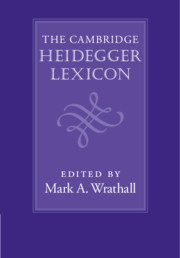Book contents
- The Cambridge Heidegger Lexicon
- Series page
- The Cambridge Heidegger Lexicon
- Copyright page
- Contents
- Contributors
- Preface
- Acknowledgments
- Using the Lexicon
- Chronology of Martin Heidegger
- Abbreviations for Heidegger’s Works
- A
- B
- C
- D
- E
- F
- G
- 93. Gathering (Sammeln, Sammlung)
- 94. Gigantic (Riesige)
- 95. Givenness (Gegebenheit)
- 96. God or Gods (Gott, Götter)
- 97. Good (das Gut, ἀγαθOν, bonum)
- 98. Guilt (Schuld)
- H
- I
- J
- K
- L
- M
- N
- O
- P
- R
- S
- T
- U
- V
- W
- German–English Glossary
- Bibliography
- Index
98. - Guilt (Schuld)
from G
Published online by Cambridge University Press: 17 April 2021
- The Cambridge Heidegger Lexicon
- Series page
- The Cambridge Heidegger Lexicon
- Copyright page
- Contents
- Contributors
- Preface
- Acknowledgments
- Using the Lexicon
- Chronology of Martin Heidegger
- Abbreviations for Heidegger’s Works
- A
- B
- C
- D
- E
- F
- G
- 93. Gathering (Sammeln, Sammlung)
- 94. Gigantic (Riesige)
- 95. Givenness (Gegebenheit)
- 96. God or Gods (Gott, Götter)
- 97. Good (das Gut, ἀγαθOν, bonum)
- 98. Guilt (Schuld)
- H
- I
- J
- K
- L
- M
- N
- O
- P
- R
- S
- T
- U
- V
- W
- German–English Glossary
- Bibliography
- Index
Summary
Heidegger defines guilt in general as a condition in which an agent is the reason for a lack, and there is no adequate reason (as judged according to our shared standards for judging such things) that could justify being the reason for the lack. Existential guilt is a species of this more general form of guilt, and consists in being the null reason for a nullity – that is, the agent in question is responsible without adequate justification (i.e., the agent is a null reason) for a form of existence that negates or extinguishes other possible forms of existence (a nullity).
- Type
- Chapter
- Information
- The Cambridge Heidegger Lexicon , pp. 365 - 368Publisher: Cambridge University PressPrint publication year: 2021

